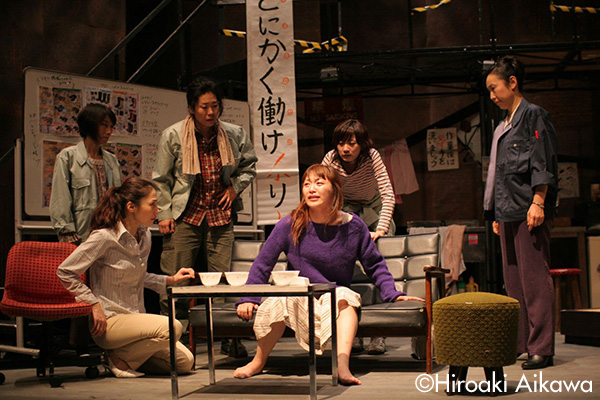On a summer afternoon, two women, Kanoko and Akane, are climbing the hill to the factory, where they are hoping to be hired. As they talk to a man named Tobio, who appears to be an employee but is actually the pimp of a female employee named Shiroza, the employees begin to return to the dorm lounge on their lunch break. Among the employees are the brothers Kanji and Zenji, now in the midst of a boisterous fight, the hearing-impaired shoemaker Itadori, the woman Shiroza who unexpectedly appears wearing a negligee and a group of apparent old misses in the younger sisters of the factory owner, Mine, Oba and Kei.
The former securities company employee Akane, who has done time in prison for embezzling what she claims to been 100 million yen (but was actually 300,000 yen), and Kanoko, who has fallen from her former suburban life after her husband ran off with another woman, are both hired on the spot in their interview with Mine and given room at the company dorm as part of the deal. The two begin their new life among a tangled menagerie of human relations, including Tobio and Shiroza with their lovers’ spats, the factory owner and the factory owner Kaede, who has taken in a young aspiring writer named Sawara.
Summer is nearing its end. One night, a private detective named Ariake comes to see Kanoko. She has hired him in an ongoing effort to find the husband who left her but Ariake wants to know, “Are you chasing him, running from him or doing this from spite?” As they talk the air wafts with the sweet smell on rubber.
It is late autumn. Akane’s older sister Tomoe, who is a doctor, has come to take her sister away. Tomoe clearly looks down on this life at the factory, but seeing that, Akane shouts, “This is my home now. I want to get things back together here.” Just then, Mine comes running in saying that Sawara has been chosen for an award by a publishing company. Mine is worried that this will make Sawara someone of a different world beyond their reach.
The next scene is during a snowstorm in the dead of winter. Once again the private detective Ariake comes to see Kanoko and report that her husband found out about the investigation and given him divorce papers to deliver to her. Upset to learn that her husband’s lover is now pregnant, Kanoko desperately presses Ariake for answers. Meanwhile, Tobio is sick in bed but continues to joke around with Shiroza, as if to relieve their anxiety.
The snowstorm has caused an electric power failure. In the semi-darkness Itadori appears unexpectedly and asks Kanoko to try on a pair of shoes he has made. Itadori has been making sketches and prototypes with the aim of creating shoes that will not tire the feet no matter how long one walks, and now he has made a trial pair in the shoe size of Kanoko, whom he secretly has feelings for. The hands of Itadori, as they guide the feet of Kanoko gently into the shoes from toe to heel have touched and soothed her pained heart as well.
Now it is spring and the cherry blossoms have begun to fall. The factory is busy preparing shipments of its sandals. Today is the day the Sawara will leave oe n a journey to concentrate on his writing. Tobio has already passed away. Then Kanoko comes walking up thhill for the first time since having quit the factory some time ago. This brings the group alive. Kanoko has decided to return to the factory. Kanoko asks Itadori solicitously if it’s all right for her to stay. Just at that moment, through the window to the office, Kanoko notices the legs of Shiroza standing on a chair. The sight brings to mind an image of a woman committing suicide that appeared to Kanoko frequently in her troubled period after her husband left her. Not a moment to late, Kanoko has sensed that Shiroza is about to hang herself and everyone runs in to stop her.
“There is no place left for me in this word,” says Shiroza in her desperation at the loss of Tobio. “You will find a place,” Kanoko answers. “You can go anywhere you want, so why don’t you stay here with us.” These are also words that express what Kanoko wants to tell the people of the factory about her feelings.
From outside, Mine announces that the preparations are ready for their cherry blossom-viewing party. The women all smile in relief and delight. Among them are women who stand alone, women who support each other and women who allow themselves to be led by the hand. After the others have all gone outside, Kanoko reaches out her hand to Itadori.



